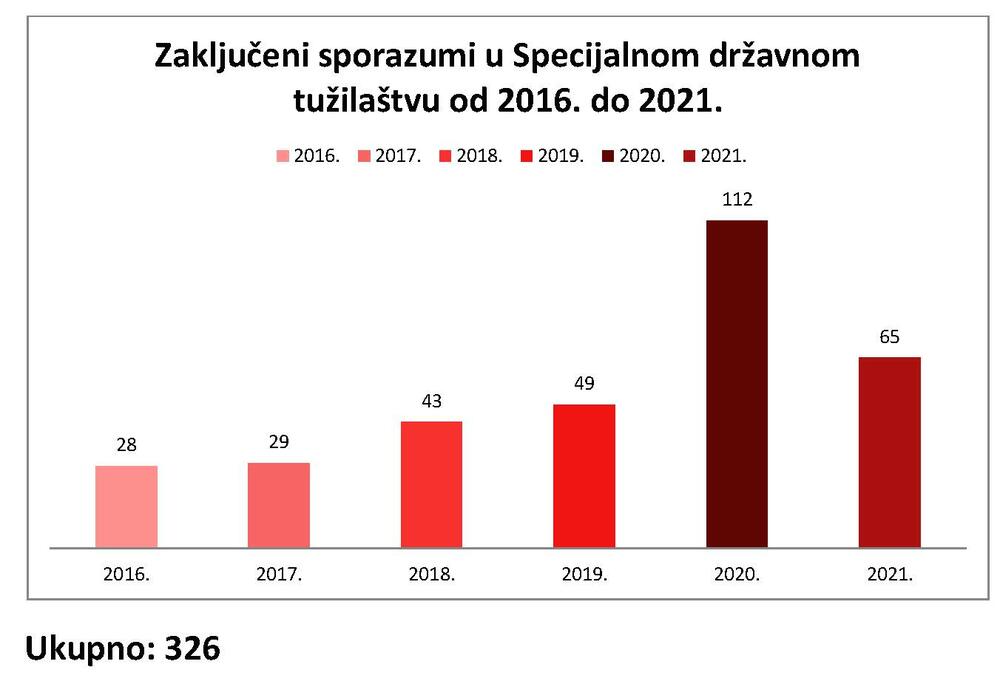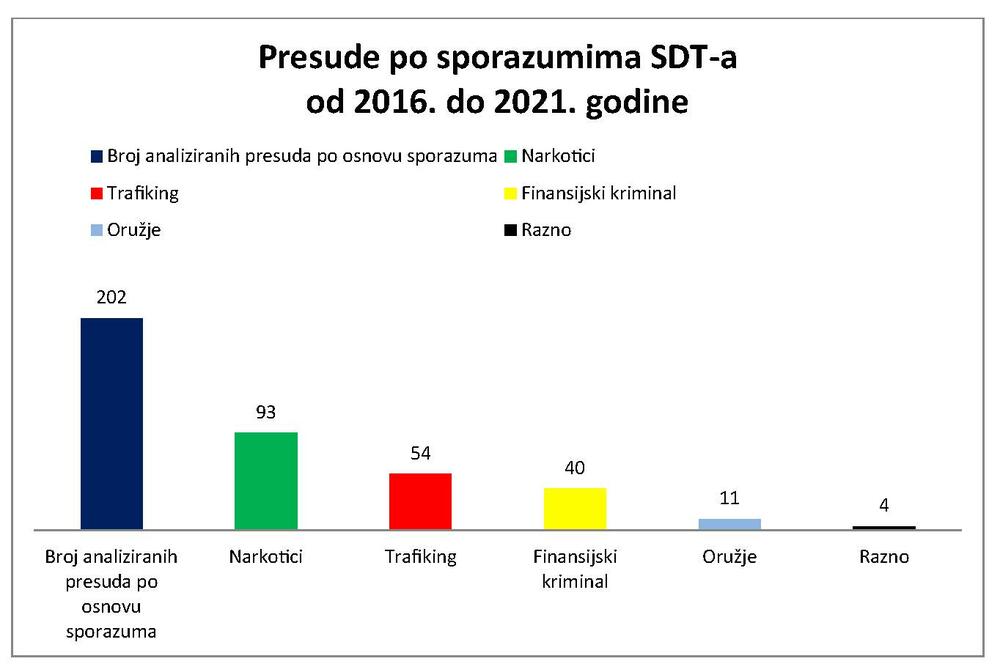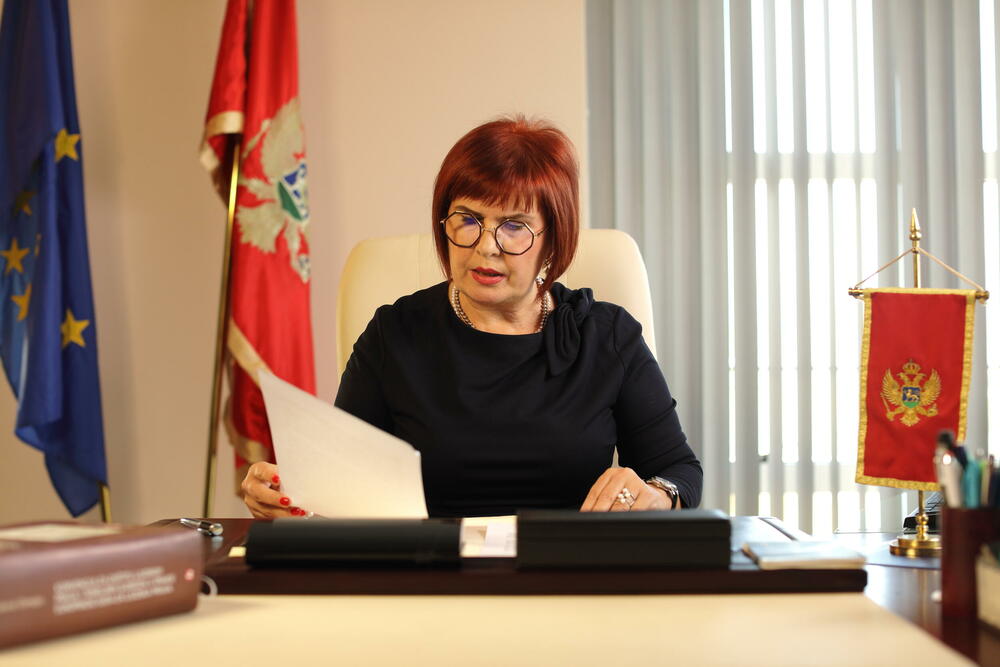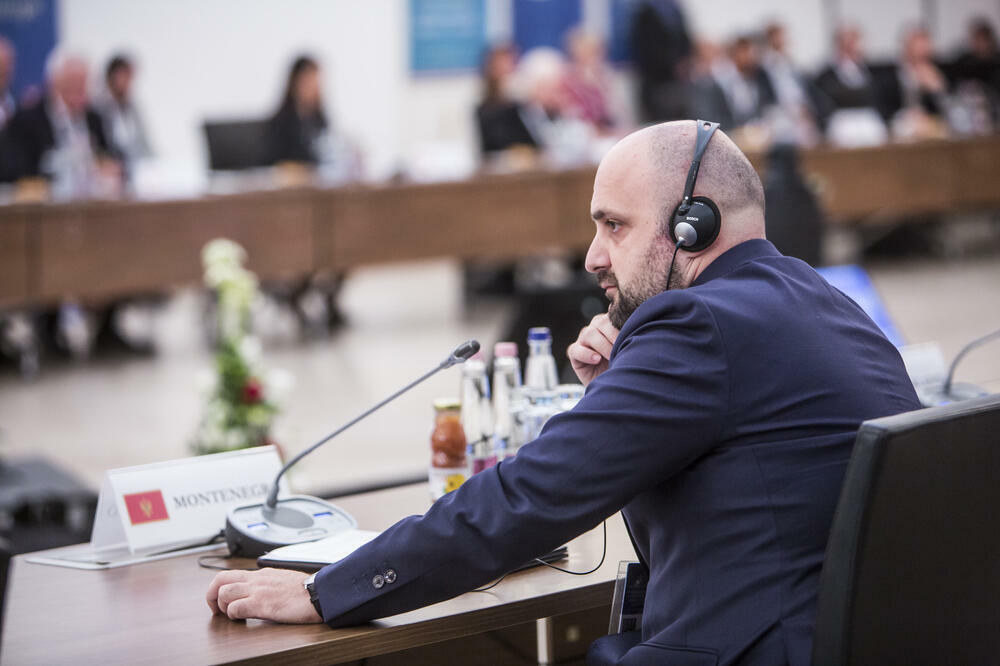In 40 agreements of the Special State Prosecutor's Office (SDT) in cases of multimillion-dollar fraud, abuse of position, money laundering and tax evasion, the defendants were sentenced to symbolic sentences - 28 suspended sentences, seven suspended sentences and five prison sentences of six months each.
In the largest number of these settlements, more precisely in 31 cases, the president of the High Court in Podgorica decided Boris Savić.
How is it possible that for such serious crimes, for which one should go to prison for several years, such light sentences are imposed, even though it is a plea agreement?
President of the High Court Boris Savić for Center for Investigative Journalism of Montenegro (CIN-CG) replies that it is inappropriate for him to comment on the decisions he made himself, stating that they are legal, and that he stated the reasons for the judgments in the explanations.
"The electronic case allocation system is such that it is impossible to influence which case will be given to which judge, and my actions are a consequence of the fact that, as the president of the criminal non-trial panel, I participate in the scheduling of cases in which the agreement is delivered simultaneously with the indictment, and not after it," he said. is Savić.
In the case of a plea agreement, the sentence is not determined by the court, but is agreed upon by the prosecutor and the defendant. However, the court should have a key role, because it can reject the agreement if, among other things, the agreed punishment is inappropriate.

After the change of government on August 30, 2020, it was announced several times that the focus of the Ministry of Justice will be numerous agreements signed with perpetrators of criminal acts.
All SDT agreements, and there have been hundreds of them in the last six years, refer to criminal acts of organized crime, corruption, trafficking in drugs, weapons and people.
According to unofficial information from CIN-CG from the top of the judiciary, the largest number of cases of organized crime and corruption were resolved by agreement, and not through proof in court proceedings, which, according to lawyers, could be problematic, because it speaks of the system's insufficient ability to prove indictments in the court process and resolves them within a reasonable time.
In a large number of cases, fines are not even imposed on those accused of creating a criminal organization, fraud, money laundering and abuse of office, where the motive for criminal acts is money, through settlements. Thus, many of the convicts, even though they participated in millions of financial frauds, do not return the money they illegally acquired.
In 40 agreements, in cases of multimillion-dollar fraud, abuse of position, money laundering and tax evasion, which CIN-CG analyzed, the prosecutors in most cases charged the defendants with a more lenient attitude than the one provided for those crimes.
Special prosecutor Lidija Mitrović, settled in eight cases.
SDT prosecutors made one settlement each Sasa Cadjenovic, Sanja Jovićević, Stojanka Radović, Lidija Vukcevic, Nataša Bosković i Zorica Milanović.
In 26 decisions, which we received under the Law on Free Access to Information, the name of the prosecutor who concluded the agreement is not mentioned.
Thus, 27 accused members of criminal groups who embezzled millions of euros, including persons from the "Klap" and "Vardar" cases exposed by the media, were sentenced by agreement only to suspended sentences and to pay a few thousand euros each. All these agreements were approved by judge Savić, and most of the agreements were made by prosecutor Mitrović.
The defendants in those 27 settlements were responsible for the criminal offense of creating a criminal organization, punishable by one to eight years in prison, and tax and contribution evasion, punishable by one to six years in prison with a fine.
According to the Criminal Code (CPC), these sentences can be reduced for a maximum of three months, while a more severe sentence than prescribed can be imposed for prolonged crimes.
Officials accused of abuse of official position and money laundering received seven fines, for which crimes punishable by prison sentences of one to 12 years, which could be reduced by a maximum of three or six months.
Thus, the vice president of the Budva municipality received a house arrest of 75 days Milenko Medigović for abuse of official position during the construction of the Petrovac promenade. He was directly in charge of monitoring the investment, and he was charged with demanding the contractor to carry out work that was not foreseen and thus damaging the municipality for 232.543 euros. At the same time, the promenade was never completed, and it cost about eight million euros. Medigović did not have to pay anything with the settlement, except for a few hundred euros in court costs. In addition, he was charged with the most lenient attitude for this criminal offense. According to the damage that was done, he should have been charged with the most serious offense with a prison sentence of two to 12 years in prison.
This settlement was confirmed by a High Court judge Suzana Mugoša, and the verdict does not say which plaintiff made the agreement.
They received sentences of six months in prison each Branislav Gugi Savić, Stjepan Skočajić i Dragoljub Milovanović, convicted in the well-known corruption scandals in Budva. And that for the act of abuse of official position, for which prison terms of two to 12 years are provided. None of them were fined, although the damages to the state were in the millions. Through settlements, even their companies received only suspended sentences, that is, they do not have to pay fines, if they do not commit new criminal offenses within a year.
Branislav Savić agreed on two settlements due to million-dollar embezzlement in Budva, one with Saša Čađenović and the other with Lidija Vukčević. Both times he was sentenced to six months in prison.
There are no names of prosecutors for the other two agreements concluded by Skočajić and Milovanović. They were accused of embezzlement during the construction of the Jaz plateau and the waste water plant in Budva. All settlements were accepted by judge Boris Savić.
Although CIN-CG and the Center for Civil Liberties (CEGAS) have requested from the High Court all verdicts based on the plea agreement since 2016, when the newly formed SDT took over Milivoje Katnic, among the 202 submitted decisions, there are no settlements with Svetozar Marović and his son By Miloš and several other agreements related to the aferm in Budva.

It is known to the public that the former high official of the Democratic Party of Socialists (DPS) Svetozar Marović agreed that, as the organizer of a criminal group that damaged Budva for over 45 million euros, he will be imprisoned for a total of three years and nine months and pay 100.000 euros. Also, he was supposed to return something over a million euros to the budget. However, it is still unavailable in Montenegro, and the sentence expires in October 2026. So far, the state has managed to collect only a third of the money it claims from his property. His son Miloš, also on the run, agreed to serve a year in prison and pay 385.000 euros. He returned the money, but the prison sentence expired in September 2020. And these agreements were approved by the President of the High Court, Boris Savić.
Among the 40 SDT agreements analyzed, there are also four returnees. All four received suspended sentences or house arrest. Three agreements were adopted by the president of the High Court, Boris Savić, and one by a female judge Dragica Vuković. In the judgments that we have seen, the names of the prosecutors who made the agreements are not mentioned.
In one of these four cases, the accused of money laundering, who was previously convicted abroad for smuggling cocaine, and "laundered" the money in Montenegro, after an agreement with SDT, was sentenced to only three months of house arrest and to pay 5.000 euros fines.
The second returnee, who does not write what he was previously convicted of, was suspended for one year and two months and ordered to pay 15.000 euros. He was tried for the creation of a criminal organization and prolonged evasion of taxes and contributions.
The third returnee was sentenced for tax and contribution evasion, suspended for six months and fined 5.000 euros.
The fourth returnee was suspended for six months and ordered to pay 2.000 euros for prolonged fraud and money laundering.
The EU wants to limit settlements
In the European Commission (EC) Report for Montenegro from 2021, it is emphasized that the use of plea agreements should be limited to exceptional cases only, in order for Montenegro to face the challenges of corruption and organized crime more effectively.
In the report, they point out that the penal policy for these crimes should be more consistent, in order to curb corruption and crime.
However, the EU's warnings did not seem to mean much to the former Chief Special Prosecutor Katnić. Even though he said in the middle of 2019 that no more agreements would be signed with defendants for the most serious crimes, but that the most severe punishments would be proposed, this did not happen. On the contrary, until the end of his mandate, the practice of resolving most SDT cases by settlement continued.

In the last six years, in addition to these 40 agreements, according to the documentation provided for our research, SDT also signed 93 settlements for organized drug trafficking, 54 for trafficking, 11 fines for arms trafficking, two for cigar smuggling and two for the creation of a criminal organization in in connection with the Democratic Front protests in 2016. All these settlements were accepted by the High Court in Podgorica.
In most of the concluded agreements, members of criminal organizations received three months in prison for creating a criminal organization, which is otherwise punishable by a prison sentence of one to eight years under the Criminal Code. As a rule, prisoners in agreements do not exceed one year for criminal offenses dealt with by the SDT.
And in most of these settlements, for crimes in which the motive of execution is money, there are almost no fines or they are symbolic. It is also interesting that women had an even better position in the proceedings for the creation of a criminal organization, so they received fines and suspended sentences.
Thus, a member of a criminal organization that rented apartments to hide criminals who were preparing liquidations, committed violence, intimidation, murders, drug smuggling and transmitted messages to them was accused, sentenced to six months of house arrest. The plaintiff made that settlement Tatjana Žižić, and adopted by the judge Biljana Uskoković.
And for returnees, a sentence or a couple of months in prison
Her "colleague" from the same group, previously convicted of creating a criminal organization and illegal possession of weapons, was sentenced to four months in prison. Two automatic rifles, a pistol, a hunting rifle, ammunition were taken from him... The settlement was made by Saša Čađenović and adopted by Boris Savić. It is interesting that in this case the same prosecutor and the same judge punish two previously unconvicted members of that criminal group more severely for the same crimes. They received a third more than returnees - six months in prison each.
In the majority of analyzed settlements with previously convicted persons, this was not taken as an aggravating circumstance with the explanation that it was not a case of the same type of criminal offense or that a certain amount of time had passed since the previous sentence. And even when it was about the same criminal acts, symbolic punishments were agreed with mitigating circumstances - confession, unemployment, children, which, in the opinion of the courts, "relativized" earlier convictions.
For the creation of a criminal organization and people smuggling, the returnees were imprisoned with a nanoleg, and here it happened that unconvicted persons received a greater sentence than the returnees.
Thus, for creating a criminal organization and people smuggling, three previously unconvicted received six, eight and ten months in prison, while five returnees were sentenced to lighter sentences - three in prison, and two in five months each, which they had already served in custody. All these settlements, except for two, were approved by a judge of the High Court Ana Vuković, and concluded by the plaintiff Mira Samardzic.
Judges Biljana Uskoković and Dragoje Jovic. People smuggling is punishable by a prison sentence of one to ten years, which, according to the CC, can be reduced by three months.
Commenting on the conclusion of the agreement with the returnees, the representative of Montenegro before the European Court of Human Rights and former judge of the High Court Valentina Pavlicic for CIN-CG points out that such type of settlements could very hardly meet the criteria of fairness, and especially the requirement that such a punishment corresponds to the purpose of imposing the sanction.

She also emphasizes that the wide application of conditional sentences and sentences below the legal minimum, which are imposed when entering into agreements, creates a perception of the penal policy as mild and inadequate. It is also a kind of privilege of the defendants. The wide application of this institute is disputed, warns MP Pavličić, especially in the case of organized crime and corruption.
It is also problematic that persons who have been sentenced by settlement and received a sentence that they agreed upon themselves, very often use other advantages that follow them in the process of execution of the sentence, such as a reduction of the sentence by parole or pardon.
"The application of this institute and how the credibility of the court can be damaged, if the prosecutor's office ignores the goal of general and general prevention and only has in mind the reduction of the number of cases and their quick conclusion", assesses representative Pavličić.
The court rejected only a few agreements
According to the data from the prosecutors' reports, in the last six years, the courts have rejected only a few agreements, which were agreed upon by the SDT.
The higher court in Podgorica would have been blocked if there was no possibility for the cases to end with a settlement, the president of that court, Boris Savić, told CIN-CG.
"Had it not been for the application of this institute, the High Court would have been occupied with work in the so-called 'Budva cases' until today, and it is a big question how much space would be left in the court and in the prosecution for all other cases", assessed the President of the High Court.
The public has the right to draw conclusions about whether the punishment is too high or too low, says Savić, but he also points out that "rigorous punishments have not shown good results in terms of general and special prevention".

Savić emphasizes that one of the primary goals of concluding the agreement was the return of confiscated property benefits. However, in the majority of judgments that CIN-CG had insight into, the defendants generally did not compensate the state for damage, nor were they deprived of property benefits.
The institute of consensual guilty pleas in Montenegro began to be used in February 2010. At that time, according to the CPC, the agreement could not be concluded for criminal offenses punishable by more than 10 years in prison. The law was changed in August 2015. Since then, settlements have been possible for all criminal acts, except for war crimes and terrorism. Those changes also stipulate that the suspect or the accused can initiate the conclusion of an agreement, which happens most often in practice. It was these changes in the law that led to the widespread use of this institute by the SDT and the practice by which crime pays off.
The role of the court is marginalized
Representative Pavličić emphasizes that the negotiation process is non-transparent, and the role of the court is marginalized, given that it appears only in the role of someone who confirms what was agreed upon.
"Court practice and the issue of measuring justice through this institute has been reduced to only the so-called administration of the court", assesses Pavličić.
Proposing a lighter sentence below the legal minimum is possible, she adds, but the state prosecutor is obliged to follow the general rules for imposing and mitigating the sentence.
"The court is the one that is authorized to confirm that this is in accordance with the law," emphasizes the former judge of the High Court in Podgorica.
The Ministry analyzes the agreements
State Secretary in the Ministry of Justice Bojan Božović stated for CIN-CG that the revision of the criminal legislation and the analysis of the application of consensual guilty pleas are in progress, which will provide clear recommendations for possible changes to the law, but also help to apply this institute more efficiently. The focus, he claims, will be on the penal policy established by settlements.

"Often, the professional public expressed criticism that the plea agreement did not achieve its purpose, because the sanctions were much milder than 'expected'. If this is indeed the case, and a large number of indications point to it, we must act institutionally and solve this deficiency as soon as possible," Božović pointed out.
In part, he adds, this institute has justified the purpose and relieved the burden of court proceedings, but the fact that it is necessary to review the legal solutions in relation to the victims of criminal acts must not be ignored.
"Here, above all, we are thinking of criminal acts of domestic violence, human trafficking and criminal acts against sexual freedom," he pointed out.
France limited settlements, in Germany the key role of the court
In systems that use the institution of plea agreements, there is an established practice of maintaining penal policy tables - instructions that enable the perpetrator of a criminal offense to predict the punishment that may be imposed on him in a specific case.
In Germany, the court has a key role in the plea agreement process and has the right to determine the minimum and maximum sentence, before entering into a plea agreement.
France excluded from the settlements the criminal acts of murder, assault on life and body, as well as against sexual freedom, believing that in this way it would be more fair to the victim.
The prosecution does not react
The Acting Supreme State Prosecutor, Maja Jovanović, did not answer CIN-CG's questions about whether she would do anything to finally end this practice of collusion, but neither did she answer a number of other questions related to plea bargains.
Pavličić, as well as Savić, point out that it is the Supreme Prosecutor's Office that should issue practical guidelines, which would regulate the actions of prosecutors during negotiations in a detailed manner.
"Also, I believe that the principle of transparency in this type of proceedings must gain more importance, especially in the context of cases that are in particular focus of the public, such as cases in the field of organized crime and corruption," concludes Pavličić.

Bonus video:




